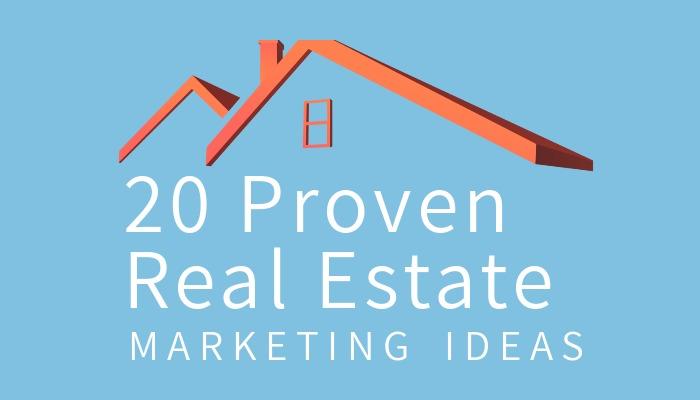Real Estate Marketing Tips
The world of real estate has changed. Once upon a time when people were searching for real estate professionals, they’d get a referral from a friend or colleague. Or they might keep an eye on yard signs and real estate flyers and then contact realtor’s whose signage popped up frequently in the community. Thanks to a massive digital revolution, this is not necessarily the case any longer.
Real estate has been reinvented in many ways, just like any other industry. A robust online presence for your real estate business is critical, at least if you want to be competitive. More and more, clients are taking to online searches to find real estate agents who meet their criteria. They’re not limiting themselves to working with just local professionals either.

Keep in mind too, that the rise of a la carte real estate services has proven to be yet another problem for many REALTORS. This is why real estate marketing and, in particular, creating dynamic content is so key to keeping your small business active. You have to consistently be producing the type of content that emphasizes your value and your brandvoice. Make no doubt about it, your real estate business and its success will depend on effective marketing and ensuring that people come to recognize your brand.
In this guide, we look at some strategic tips for helping to position your real estate business optimally. We focus on the kind of writing that will get you noticed and most importantly, that will get you more clients!
Table of contents:
- ● Real Estate Marketing Tips
- ● Consider Your Brand
- ● Define Your Real Estate Marketing Goals
- ● Start with Your Website and Social Media Pages
- ● Make Your Listings Easily Accessible
- ● Utilize SEO Strategies
- ● Make Sure You Have a Blog Page
- ● Remember to Ask for Their Email Address
- ● Marketing Content to Help You Get More Leads
- ● How-to Articles
- ● Customer Experiences
- ● Niche-Specific Articles
- ● Curated Content
- ● Local Information and Tips
- ● Real Estate Marketing Content – Make Your Writing More Readable
- ● Keep it Simple and to the Point
- ● Don’t Be Overly Sales Driven
- ● Avoid Too Much Filler
- ● Keep It Real
- ● Create Content that People Can Share
- ● Tip 1 – Very relevant for real estate – know your budget!
- ● Tip 2. Plan your project in advance
- ● Tip 3. Maybe Mobile is for You
- ● Tip 4. Your various video types
- ● Interview or Company Promotion
- ● Property Tour
- ● Answer Their Questions
- ● Tip 5. Editing Your Real Estate Content
- ● Tip 6. Get Creative with Your Video Content Strategy
- ● Tip 7. Tell a Story with Your Video Marketing
- ● Tip 8. Promote your real estate business
- ● Tip 9. Focus on Features
- ● Hope With Houses
- ● Lay of the Land
- ● Bring Your Business to Life
- ● Tip 10. Area, Activities, Amenities
- ● Tip 11. Know Your Video Audience
- ● Family Focus
- ● First Time Out of Home
- ● The Retiree
- ● Tip 12. Use New Technology in Video Marketing
- ● Tip 13. Be Yourself!
- ● Friendly and Approachable
- ● Include Contact Information
- ● Be Yourself, Be Relatable
- ● In Conclusion…
Consider Your Brand

Why emphasize brand in terms of marketing real estate services? Cultivating your brand and consequent brandvoice is how people will come to identify you. When it comes to real estate writing, it will be all about your message—along with overall tone and style. Selling and buying homes involves a very personal connection in many respects. The way you present your brandvoice in writing will either foster those types of connections or turn potential clients away.
This brand/brandvoice will be established not only by how you write that amazing real estate marketing content but also by the kinds of content you write. Writing and branding for your social media pages will also be key. So let’s dive into a few great tips as far as generating your real estate writing voice and the various pieces of content that you need to be creating.
Define Your Real Estate Marketing Goals
Step number one: what are your goals as far as marketing real estate? Having definitive goals in mind when it comes to content creation is key. Some common real estate goals where dynamic content can definitely come into play including increasing your brand’s exposure, ramping up your social media and converting leads.
Of course, this list is by no means exhaustive. There are numerous goals that you might have in terms of a real estate marketing strategy. First and foremost, you need to remember that the more you define what you hope to accomplish for your small business, the better blueprint you will have for your content marketing strategy moving forward.
Start with Your Website and Social Media Pages

When it comes to real estate, the first place people go is often to real estate agents’ websites. This contains all of the important information after all. Beyond your listings, your website needs to showcase your experience, your community knowledge and it can also offer tips for helping both buyers and sellers when it comes to their home. Writing for real estate really does start with an informative website and the kind of message that potential clients can get behind. Again, it is all about establishing that personal connection and subsequently earning people’s trust. As you create content for your real estate website, keep in mind the following.
Make Your Listings Easily Accessible
We will get to the actual writing portion in a moment, but absolutely essential to any good real estate website are listings that are front and center. People may stumble upon your website because of a specific listing. If they can’t then easily find it, they’re only going to get frustrated and go elsewhere. Could you possibly make the site more user-friendly overall? Convenience and ease are so crucial to a positive website experience.
To this end also, you want to keep the site relatively simple. It doesn’t need to be overly cluttered. In fact, when it comes to house hunting, the simpler and more streamlined, the better. If upon arriving at your real estate landing page, a user is bombarded with a ton of nonessential content, they’ll likely head to a site such as Trulia or Zilllow instead. What will keep them on your website? This is what you need to think through.
Utilize SEO Strategies
Particularly with the real estate market, taking advantage of keywords especially will help you rank higher when people take to Google for their real estate needs. SEO strategies and tips are available online—just google them. The main thing is to familiarize yourself with what the more common search terms are. Of course, you don’t want to overstuff your website pages with these keywords but understanding how to implement them will help you get found.
Using location words too can be incredibly helpful for real estate agents. Obviously, people will be searching for listings within certain areas or a community. Knowing what the most relevant ones to your small business are and including those locations in your website text is another smart SEO strategy as far as marketing goes. Additionally, you can use location tags in paid ads through Google or Facebook for example.
Make Sure You Have a Blog Page

We will talk more specifically about the various types of blog posts you might want to do, but the inclusion of a blog in general is a must for most REALTOR sites. Remember that connection that you’re trying to establish with potential clients. A blog lets you speak more directly to them and thereby gives your business website a more personal feel.
Blog posts also can become shared content. Someone comes to your site for instance and reads about “how to help your moving experience go better.” If you actually offer useful tips and advice, this could definitely be something that gets shared on multiple social media platforms.
Remember to Ask for Their Email Address
Every blog post should include some sort of call to action. Often this will be an email collection strategy. So toward the bottom of your blog post, be sure to invite readers to subscribe to your email list. This way you are getting permission to send them future email updates, newsletters and any promotions and/or info on a program you might be running.
Marketing Content to Help You Get More Leads

Once you’re happy with your website and have established the necessary social media accounts, then it’s time to think about what kinds of content you should be creating. From home listings, to ads, to blog posts, to how-to’s, there’s a wide range of articles and other marketing collateral that as a real estate professional you should be putting out there. And as you do create these pieces, always keep that brandvoice in mind. Style, tone, and messaging need to point back to the essence of your real estate brand.
How-to Articles
Especially when it comes to home sales and home buying as well, people are looking for guidance. They’re looking for those tips and strategies to help them get the best deal, negotiate a fair price, maximize the profit on a home sale, among other topics you could write on. Within the context of your site’s blog, you could offer a number of how-to style articles. You might even consider creating this kind of piece for LinkedIn or sites such as Houzz. The more info you provide people, the more apt they will be to think of you when they do need a real estate agent.
Customer Experiences

Users naturally will be curious about previous client experiences when it comes to working with you. No real estate marketing campaign will be complete unless there is a testimonial/review component. It’s a must-have for any real estate agent.
And you can always offer to write up something by way of a template to help make it easier on clients who have hectic schedules. Of course, you will want to get them to sign off on the finished version.
Niche-Specific Articles
Maybe you primarily specialize in working with buyers. Or maybe you deal in rental property sales. Some real estate agents focus exclusively on condos and townhomes. Whatever your niche, if you can create articles centered around it, this can add a ton of value to your site and social media accounts.
The more specific you can get as far as article topic, the more likely that a person searching for that information will find it. Writing that focuses in on a niche within the real estate world just lends itself to being more keyword-friendly.
Curated Content
There’s no rule that says you have to generate all writing and content on your own. In fact, with Facebook and other such social media sites, using curated content (or interesting industry articles and posts from other experts) can be a great strategy. Real estate marketing in many ways is about informing and earning trust. By openly sharing content/information that you yourself found helpful, you are going even a step further in demonstrating your honesty and transparency.
Local Information and Tips
When buyers especially are looking for a home to purchase, they will often also search for resources local to the community in which they’re searching. On your website then you might create a list of relevant local links and also briefly describe what each is and why it might help your clients.
For example, you can offer surveys related to the local schools. Or how about creating a listing of local entertainment and dining options. You could also offer relevant statistics such as those related to crime, income, and general demographics for a given community.
Real Estate Marketing Content – Make Your Writing More Readable

We’ve covered the type of content you should consider creating for your website, Facebook page and other social media channels. But how should you go about tackling real estate marketing writing? There is definitely strategy involved. From something as simple as an email to a more complex article and/or newsletter, you still want to have a cohesive and unified tone that reflects your overall brandvoice.
You also want to be sure that the content you write is personable. That is to say, you want people to be able to relate to you whether that is on your website or on Facebook. Avoid jargon and overly technical marketing sentiments in favor of more conversational writing. And then keep in mind the following writing tips:
Keep it Simple and to the Point
In other words, refrain from writing an entire book on your website. Sure, there’s probably a lot you want to say to potential clients, home tips you want to offer at length, programs that could help them sell faster for instance. But if your site gets too wordy, users will lose interest. They do not want to have to wade through a densely packed page to reach the main points. Include all necessary marketing information but do so in a way that makes it easy on a reader’s eyes and attention span.
Don’t Be Overly Sales Driven

Your content should connect with people. If you use too much of a marketing/advertising style language, this will inevitably turn users off. They are on your site or social media pages to learn about you, your home buying/selling approach and what information you might be able to provide. They are not there to try and have you constantly sell them on how wonderful a real estate professional you are. Marketing done tactfully and transparently is what you need to think about.
Avoid Too Much Filler
Many are guilty of trying to add more marketing text and therefore more crucial keywords by incorporating a ton of filler content. Again, the effect here is that the website page will become really text-heavy and a user will more than likely scroll away. People are pretty good at identifying the “fluff” that is basically irrelevant to what they’re actually searching for. They like it when you get to the point without dancing around it with marketing jargon.
Keep It Real
This is perhaps the best piece of advice for anyone engaging in a real estate marketing campaign. You’re dealing with the buying and selling of homes, family homes, first homes; that said, clients will only work with you if they trust you with that home. The more real your writing, the more open and honest, the better your chance of attracting new customers. A heavy marketing hand will simply not cut it in this business.
Create Content that People Can Share
Video is such an impactful way of showcasing certain aspects of your real estate business. There are a variety of different types of real estate videos that you could use, maybe a video about your business, a testimonial video, a day in the life of your job, the list is endless.
Pay attention to video marketing, which in this case is the act of creating a real estate video to attract a specific group of people to your real estate business.
The more value you can bring, the more users will come to associate your brand voice with a positive and useful experience. And then the more willing they will be to share on platforms like Facebook and Instagram.
These 13 top tips will get you ready to start your journey and inspire you to make the best real estate video you have ever seen.
Tip 1 – Very relevant for real estate – know your budget!

Consider hiring a videographer. While this may seem costly, a professional brings valuable expertise, equipment, and high-quality production. They can guide you on the best approaches to achieve your desired results. Ensure you research and find the right videographer who fits your budget and needs.
Tip 2. Plan your project in advance

Moreover, think about the setting, props, and people involved. Provide clear instructions to participants about their roles and attire.
Tip 3. Maybe Mobile is for You

Many successful mobile feature films demonstrate that phones can produce premium content. For real estate, mobile videos can be ideal for testimonials or live social media broadcasts, providing a less intimidating setup for subjects.
Tip 4. Your various video types

Interview or Company Promotion
Property Tour
Answer Their Questions
Tip 5. Editing Your Real Estate Content

Design Wizard is a versatile tool that offers a balance between quality and accessibility. It allows you to customize your video, add animations, and integrate your brand. Its user-friendly interface makes it easy to produce high-quality videos quickly.
Tip 6. Get Creative with Your Video Content Strategy

Differentiate your brand by focusing on what makes you unique—whether it's your interaction with clients, property showcases, or the types of properties you sell. Incorporate your logo, company colors, and business values in your videos to create a genuine connection with viewers.
Create content with your audience in mind to build genuine engagement. Retargeting leads who have previously shown interest can lead to more sales. Use social media and tracking features to identify qualified leads.
Tip 7. Tell a Story with Your Video Marketing

Show the future potential of a property by creating scenes of a happy family in their new home or a couple opening their new business. These hopeful and happy stories evoke emotion, driving engagement and making your content memorable.
Create content that inspires viewers by showcasing real-life success stories and future possibilities. Emotional reactions drive engagement, making your real estate videos more effective and shareable.
Tip 8. Promote your real estate business

Your best advocates are the people involved with your business—staff, clients, and partners. Featuring your team in videos adds a human touch and authenticity.
Every business has achievements worth celebrating, whether it’s a first hire, a significant sale, or an industry award. Showcase these successes in quick, engaging clips to give the public insight into your company culture. Video marketing not only boosts brand awareness and sales but also improves SEO performance on Google.
Tip 9. Focus on Features

Hope With Houses
Lay of the Land
Bring Your Business to Life
Tip 10. Area, Activities, Amenities

Creating a sense of community around a property is crucial in today's world. Prospective buyers want to know they'll be welcomed and integrated into a neighborhood. Showcasing community events like street parties or local fairs can highlight the positive aspects of the area.
Including local amenities in your video is essential. Most buyers have specific criteria such as nearby shops, parks, schools, good transport links, and attractions. Highlighting low crime rates and the overall feel of the neighborhood can sway buyers positively, but ensure a balanced portrayal.
Tip 11. Know Your Video Audience

Family Focus
First Time Out of Home
The Retiree
Tip 12. Use New Technology in Video Marketing

Drones provide stunning aerial views that differentiate listings and attract buyers faster than traditional methods. Properties with aerial images sell 68% faster than those without, underscoring the effectiveness of this technology in marketing real estate.
AI tours utilize artificial intelligence to offer interactive property walkthroughs, enhancing convenience and modernizing your approach. These tours can be accessed anytime from a property's landing page, allowing potential buyers to explore every corner virtually.
Despite initial costs, these technologies offer long-term benefits and set your real estate business apart in a competitive market.
Tip 13. Be Yourself!

Friendly and Approachable
Include Contact Information
Be Yourself, Be Relatable
In Conclusion…
The great thing about real estate marketing and content creation, in particular, is that there are so many things you can do as far as expanding your brand’s reach and drumming up more business. Consistency is going to be key with content creation. Post regularly. Update that blog page weekly. Make sure the information on the website is always accurate and up to date as well. And then by developing a mix of writing pieces and articles, emails, and ads, you have the ability to generate more leads and cultivate productive client relationships.

anne carson
Anne is a former English professor turned content writer. Holding a PhD in Literature, she spent almost a decade in academia putting that degree to use, until finally realizing it wasn't exactly the best fit. A full-time writer, she's learned a great deal about the numerous subjects. She knows a lot about design trends and design templates. A mom of five (two teenagers and three dogs).




